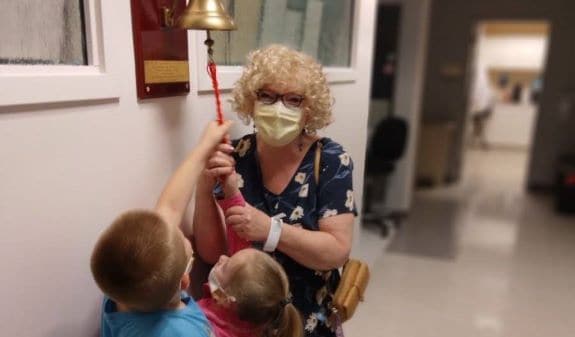Most of us have heard the term “clinical trials”, but haven’t given it much thought. Like a lot of important things that fly under the radar, clinical trials have had a huge impact on society.
At their most basic, clinical trials are a type of research study that tests the safety and effectiveness of ways to prevent, detect or treat disease. Although clinical trials of new breast cancer treatments are the focus of this discussion, the concepts apply to any type of clinical trial.
When it comes to cancer, clinical trials are one of the biggest reasons we’ve seen such major gains in breast cancer survival over the past 30 years. And improved survival hasn’t been the only benefit. Quality of life for people living with cancer has also improved as trials have helped identify more targeted treatments that can help limit many of the side effects of cancer therapies.
One of our Scientific Advisory Board members, Dr. George Sledge, Ballve-Lantero Professor of Oncology and Professor of Laboratory Medicine and Pathology at the Indiana University School of Medicine and co-director of the breast cancer program at the Indiana University Melvin and Bren Simon Cancer Center talks about the importance of clinical trials. “Research cures cancer, but only if the research gets from the laboratory to the clinic. The only way this happens is through clinical trials. These trials are the oncology “village” at its best: brilliant researchers creating new therapeutic or diagnostic approaches to target breast cancer, doctors designing the best trials to test these agents, courageous patients willing to give that most precious of commodities, themselves, for the common good. Every major gain in breast cancer in the past thirty years has come out of this collaboration, as will every future gain.”
Key to clinical trials are the supportive doctors, researchers and other health professionals- as well as dedicated hospitals, medical research centers and funders. But, most important in the whole process are the participants themselves. These are the people willing to join clinical trials that will help further the knowledge base that ultimately helps improve breast cancer treatments for people diagnosed with breast cancer in the future.
Participants themselves also benefit from clinical trials. They are the first to get a chance to receive new treatments and are guaranteed (at a minimum) to receive the best standard care possible from an experienced medical team. And, clinical trials offer a way for women with breast cancer to play an active role in their own health care and help others by adding to medical research.
Here, we discuss the types of clinical trials and how you can get more information about them. To learn more, visit the Clinical Trials section.
For clinical trials of new cancer treatments, there are four main types of trials, though there can be some overlap between types depending on the study.
- Phase 1 (phase I). Trials that test to see if a new treatment is safe to use.
- Phase 2 (phase II). Trials that test to see how well a new treatment works on a certain type of cancer.
- Phase 3 (phase III). Trials that test to see how well a new treatment works compared to the best standard treatment (standard of care).
- Phase 4 (phase IV).Trials that test the continued effectiveness and safety of a treatment after it’s been approved for use.
Some clinical trials – especially phase 3 trials – use a process called randomization to decide what type of treatment a participant gets. Randomization helps to ensure the results best reflect the true risks and benefits of a new treatment. Participants in a study are placed by chance (“randomized”) into the different treatment groups of a trial. Though used in some research studies, placebos (inactive pills or treatments) are rarely used in breast cancer treatment trials.
What are the possible benefits of clinical trials?
Clinical trials offer two main benefits to participants: the chance to receive a new, potentially better treatment and to contribute to cancer research that may help improve the treatment of breast cancer for others.
What are the possible drawbacks of clinical trials?
There are several possible drawbacks to joining a clinical trial.
- Treatment choice. In some clinical trials (especially phase 3 randomized treatment trials), you do not always get to choose whether or not you’ll receive the new treatment being tested.
- Side effects.The risks of a new treatment may not be fully understood, so there may be unexpected side effects. Though testing keep risks as small as possible, a new treatment’s side effects often aren’t fully revealed until after long-term testing and follow-up.
- Travel time and cost.While trials are done all across the country, it’s not guaranteed there will be an appropriate trial in your local area.
- Health care costs. The costs of the new treatment will usually be covered by the study itself, and most health insurers will cover the standard care provided in the study as they would other breast cancer treatments. However, it’s important to check with the study team and your insurer to make there won’t be any unexpected costs of joining the study (such as out-of-network fees).
When should I look in to joining a clinical trial?
If possible, the best time to look in to taking part in a treatment clinical trial is before receiving any type of medical therapy, either for a first breast cancer or for a recurrence. For most people, treatment doesn’t have to start right after diagnosis, so there’s some time to consider a clinical trial as part of your treatment options.
I don’t have breast cancer. Are there trials for me?
Though clinical trials most commonly study treatment, there are trials that focus on other areas as well, like prevention and screening. These studies are often looking for women both with and without breast cancer
I’m a survivor. Are there trials for me?
There are many clinical trials for breast cancer survivors who are not undergoing active treatment. These include studies looking at the best approaches for treatment follow-up and the potential survival benefits of lifestyle behaviors (such as diet and exercise).
How do I find a clinical trial?
There are many sources women can use for finding clinical trials (see list below). Each is a little different, but they all allow searching for trials based on factors like age, gender, breast cancer history, treatment history and geographic area as well as study-type preferences. For example, BreastCancerTrials.org in collaboration with Susan G. Komen for the Cure® offers a custom matching service that can help you find a clinical trial that fits your health needs. Though these sites can be helpful search tools, the best approach is to ask your health care provider or local medical center for help finding a trial.
BreastCancerTrials.org
National Cancer Institute
Center Watch
Research Fast Facts: Clinical Trials
In addition to our support of BreastCancerTrials.org, Susan G. Komen for the Cure®’s Research and Scientific Programs provide support for many clinical trials through our Promise Grants, Investigator-Initiated Research Grants, and grants to our scientific advisors, the Komen Scholars and Scientific Advisory Board. In 2010 and 2011, Komen provided more than $54 million to 74 grants that supported 83 clinical trials in the U.S. and internationally. More than two-thirds of Komen-funded studies are treatment and diagnostic trials. Learn more about the research we are funding.



